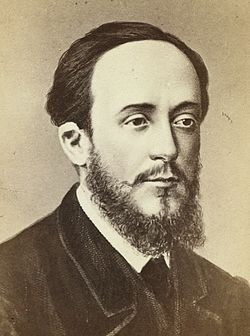- Dmitry Pisarev
-
Dimitri Ivanovich Pisarev (Russian: Дмитрий Иванович Писарев; 14 October [O.S. 2 October] 1840 – 16 July [O.S. 4 July] 1868) was a radical Russian writer and social critic who, according to Georgi Plekhanov, "spent the best years of his life in a fortress".
Pisarev was one of the writers who propelled the democratic-revolutionary trend in Russia during the 1860s. The next generation of Russians, made famous by the events of 1905 and 1917, acknowledged Pisarev's influence. Nadezhda Krupskaya, Lenin's wife, once wrote, "Lenin was of the generation that grew up under the influence of Pisarev".
Pisarev was also noted for his support of Russian natural science, particularly biology, and his works greatly influenced the career choice of the young Ivan Pavlov.[1]
Pisarev wanted, more than anything else, an end to poverty and misery. This desire he pursued through philosophy, literary criticism and social and family analyses.
Lenin's quote from Pisarev
Lenin, in the fifth chapter of What Is To Be Done?, quoted these lines from an article by Pisarev:
"There are rifts and rifts," wrote Pisarev of the rift between dreams and reality. "My dream may run ahead of the natural march of events or may fly off at a tangent in a direction in which no natural march of events will ever proceed. In the first case my dream will not cause any harm; it may even support and augment the energy of the working men.... There is nothing in such dreams that would distort or paralyse labour-power. On the contrary, if man were completely deprived of the ability to dream in this way, if he could not from time to time run ahead and mentally conceive, in an entire and completed picture, the product to which his hands are only just beginning to lend shape, then I cannot at all imagine what stimulus there would be to induce man to undertake and complete extensive and strenuous work in the sphere of art, science, and practical endeavour....
The rift between dreams and reality causes no harm if only the person dreaming believes seriously in his dream, if he attentively observes life, compares his observations with his castles in the air, and if, generally speaking, he works conscientiously for the achievement of his fantasies. If there is some connection between dreams and life then all is well." Of this kind of dreaming there is unfortunately too little in our movement. And the people most responsible for this are those who boast of their sober views, their "closeness" to the "concrete", the representatives of legal criticism and of illegal "tail-ism".
Lenin also quoted the following from Pisarev: "Break, beat up everything, beat and destroy! Everything that's being broken is rubbish and has no right to life! What survives is good". These handwritten notes, from the leader of the Russian revolution, were discovered recently by the historian Simon Sebag Montefiore in the Kremlin archives.[2]
English Translations
- Flowers of Harmless Humour, from Anthology of Russian Literature, Volume 2, Leo Wiener, G. P. Putnam's Sons, 1903.
- Selected Philosophical, Social And Political Essays, Foreign Languages Publishing House, Moscow, 1958.
Notes
- ^ Babkin, B.P. (1949) Pavlov: A Biography. Chicago: The University of Chicago Press
- ^ Montefiore, Simon Sebag, "Young Stalin", Weidenfeld & Nicolson, (2007), p. 303.
Categories:- Russian journalists
- Russian literary critics
- 1840 births
- 1868 deaths
Wikimedia Foundation. 2010.

